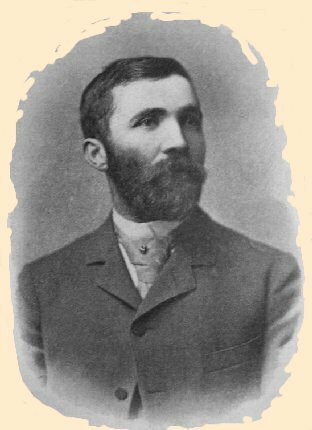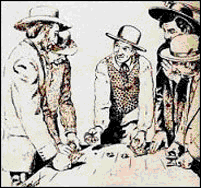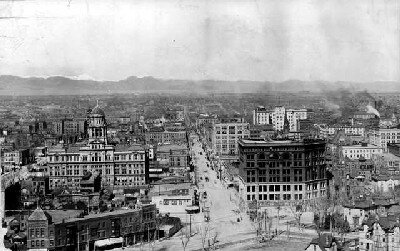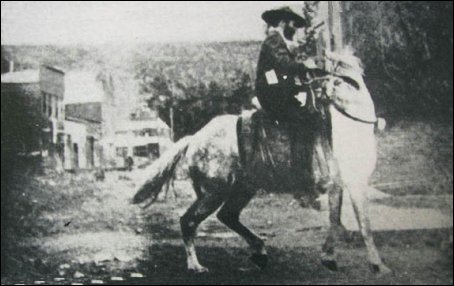|
 Jefferson Randolph Smith II, alias Soapy Smith was born in Coweta County, Georgia, near the town of Newnan in 1860. When Jefferson was about 16 (1876) his parents gathered up their belongings and moved to Round Rock, Texas in an attempt to improve their lives. Jefferson Randolph Smith II, alias Soapy Smith was born in Coweta County, Georgia, near the town of Newnan in 1860. When Jefferson was about 16 (1876) his parents gathered up their belongings and moved to Round Rock, Texas in an attempt to improve their lives.
Around 1878 young Jefferson moved from his family and set out on his own as a "sure-thing" man. He traveled around the country following fairs selling cheap trinkets and fake jewelery as a "Cheap John." He soon learned short con games such as the shell game and three-card Monte. Jefferson had become a confidence man and a scoundrel.
 Jefferson Smith (he preferred to be called Jeff) became infamously known for his prize soap package swindle, in which victims were thoroughly and beautifully taken. He set up his tripe and keister (stand and suitcase) on the sidewalk and began a spiel on the wonders of the soap he was offering for sale. He claimed that in order to increase sales, he offered cash prizes in several of the soap packages. He would begin to wrap up the cakes of soap with plain paper. Every couple of bars, he would show the crowd some currency, ranging from $1 to $100, and wrap the bill in with the soap. After mixing all of the wrapped packages together, he offered them up for sale. The price started at $1 and increased from there in auction style as the soap packages dwindled.
   Unknown to his victims, mixed in with the crowd were members of the soap gang, known as shills. Only these shills were fortunate in picking out the lucky bars of soap that contained cash. Once opening the package and finding money inside, the shill would let out a holler of celebration and begin to mingle through the crowd, letting everyone within a block or two away know that they had beat the soap salesman at his own game. They were all too glad to offer tips on how to pick the right package. It was all a swindle. There was no money in the soap packages to win. No one but Jefferson's men could ever win. In the newspapers, Jeff and his associates became known as the "Soap gang." Jefferson Smith, the shrewd operator, became known all over the United States as "Soapy" Smith. The name stuck with him to his dying day.
At least two attempts were made to assassinate Soapy. One attempt on his life occurred in 1889 while sitting in a train car at the Pocatello, Idaho, depot. A very descriptive letter in the Smith family collection tells of the ensuing gun battle between another rival gang and some of the soap gang. Soapy had shot two of his attackers before fleeing on horseback, at a full run. Writing to his wife, he talked of having half his mustache shot off.
This letter, and many more, will be fully viewable in the great grandson's up coming biography on the life of Soapy.
 |
| Denver, Colorado 1896 |
In Denver's numerous reforms of the 1880's, saloons and gamblers were temporarily put out of business. They often wandered off to towns close by to wait out the rarely long lasting reform movements. Once the reform wave receded, a signal was given and the business men of pleasure would return to Denver, often times opening up their operations in the very locations they were forced to close.
During one of the heavier attempts to close saloons and gaming in 1892, Jeff organized his friends and associates into a sort of union and set out for the new silver camp of Creede, Colorado as Soapy, overlord of Denver's underworld from 1887 to 1895, slowly began to lose his crown partly due to his rivals but mostly due to his own bad temper, causing him legal problems, ranging from simple public disturbances to attempted murder. When Soapy mixed his temper with alcohol, he became a very dangerous man. He was simply becoming too well known for his criminal activities. The local city officials could no longer look the other way, as they had done for years. The police and city hall were openly being accused of working in league with the bunco gang, which was not the least bit an exaggeration.
As things heated up in Denver and as others forced their way in Soapy saw the writing on the wall and being the smart business man he was he decided to move on. He next showed up in Skaguay, Alaska.
The sinking of the battleship Maine in the harbor of Havava, Cuba in 1898, ignited a patriotic frenzy in the American public. President McKinley asked for volunteers to join in his fight against Spain. Soapy, being a very patriotic member of society, formed all volunteer army, calling it the Skaguay Military Company. At the first meeting he was "elected" captain. A letter, along with the meetings minutes were sent to the governor of Alaska and to the president of the United States offering his armies services. In reply, captain Smith received official military permission from the War Department to march and drill his ever growing army at Fort St. Micheal, Alaska. It seemed not to bother Soapy that Fort St. Micheal was over 1000 miles away. He proudly hung the document in Jeff Smith's Parlor for all to see.
REMEMBER THE MAINE!
Join the Skaguay Military Company TODAY!
Soapy had an important agenda for his army. These "soldiers" were there to guarantee his absolute control over Skaguay. With the official permission from the war department Soapy would be able to impose martial law in the event of a disturbance by the 101 vigilante organization, or anyone else who sought to get in his way.
 John D. Stewart, who sought adventure but neither fame nor notoriety, found more of all three than he cared for in Skagway. It was while in Skagway on July 7, 1898 that Stewart met up with Soap Gang members John Bowers and James "Slim-Jim" Foster. They learned from Stewart that he had stashed his poke of gold worth close to $3,000 at the Mondimen Hotel. Bowers and Foster convinced Stewart that his gold would be safer in one of the local bank safes. They agreed to take him to meet one of the bankers, minus his poke. Along the way they cut through an alley and conveniently ran into "Professor" W. H. Jackson and Van B. "Old Man" Triplett, two more members of the gang. The boys began a Three-card Monte game and let Stewart believe he could win. He was instructed to go fetch his gold, which he did.
Stewart began to lose in his wagering and complained that he should not have to pay his loses. Seeing that Stewart was refusing to pay up, he was forcefully grabbed and the ntire poke of gold was taken. The poke was tossed to Triplett and he gave the order for the gang to "beat it." In seconds Stewart was alone and broke.
Stewart complained to the U. S. deputy marshal who did little to help Stewart as he was in the pay of the Soap Gang. Stewart began to complain to others and word spread quickly around town of the robbery. The real estate grafter gang saw an opportunity to rid the city of their competition. Between the real estate grafters, the vigilantes and the few citizens who actually cared about law and order, a large movement against Soapy and the bunco men snowballed. The U. S. Commissioner made demands to Soapy that the gold be returned. Soapy refused, claiming Stewart had lost his money on the square. Meetings were called to decide what actions should be taken. Skagway was in a mass state of confusion.
On the evening of July 8, 1898 the vigilantes were holding a meeting in a warehouse on the end of the Juneau Company wharf. Soapy was in Jeff Smith's Parlor drinking, after a full day of arguments and threats to and from the various factions against him. A little before 9pm a note was given to Soapy from an associate on the newspaper payroll to take immediate action. Soapy agreed and grabbed up his rifle and headed down to the wharf. Once there he faced four vigilante guards. Frank Reid blocked Soapy's attempt to walk down to the warehouse and enter the meeting.
Soapy walked past the other three men up to Frank Reid and started arguing with him. Apparently Soapy made an attempt to strike Reid with the barrel of the rifle, but Reid raised his left arm and the rifle barrel cut Reid's arm. Reid was able to grab the barrel with his left hand and forced it away from his body. As the two men fought for control of the rifle, Reid pulled out a pistol and began to fire. At that same instant, Soapy jerked his rifle back towards Reid and returned fire.
When the shooting had ceased, Soapy Smith was dead and Frank Reid lay badly wounded.
|